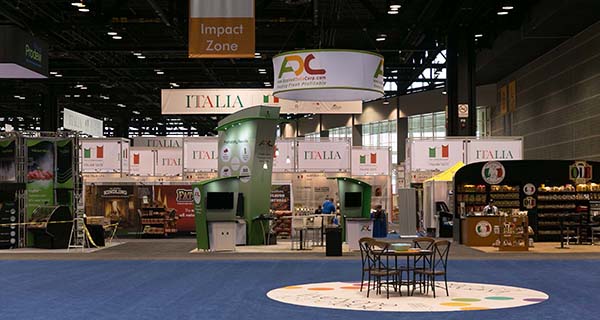
Over 60 Italian companies – from bottled water company San Benedetto and Sicilian gourmet condiment maker Campo D’Oro Villa Reale to pasta makers La Molisana – had meetings with distributors and buyers during FMI Connect, the main trade show of the U.S. retail industry that every summer takes place in Chicago. Under the umbrella of the Italian Trade Promotion Agency (ICE-ITA), Italy confirmed a record presence among the international pavilions at the show, which featured China, Greece, Mexico, Thailand and Quebec. Several managers met during the three days of the show said they had an average two-three important meetings with buyers to bring their products to the United States.
FMI-CONNECT, A NETWORKING PLATFORM – “One of the advantages of FMI Connect is the platform for one-to-one meetings Connect Business Exchange (CBX),” said Matteo Picariello, director of ITA- Italian Trade Agency in Chicago, which works to facilitate the relations between producers and retailers. Some said the meetings had been in the works for weeks, showing nothing can be improvised in a competitive market where Italian food remains the favorite international cuisine but faces competition from fresh local produce and strong demand for innovation. Several companies met at the show, like Campo d’Oro and San Benedetto, said they have offices in the US to follow distribution locally. Coop Italian Food, (see picture below) at its debut at the Chicago show, is exploring contacts to bring Italian products to the US market.
QUALITY CONTROL – On the other side of the spectrum, US retail chains are sending their own buyers to discuss directly with producers, as they seek higher margins and stricter control of food security and quality. “We are looking for regional specialties, quality products still unknown to the US market,” said Chris Mittendorf, Center Store Director at Schnucks (known as “The Friendliest Stores In Town”) one of the leading supermarket chains in the Midwest. The manager said she will travel back to Italy in September for further meetings.
CHANGING SHOPPERS – This flurry of activity needs to catch up with new trends in the US retail industry. Innovation and consumer education have become essential as traditional supermarkets lose market share to the benefit of specialized grocery stores able to offer quality and convenience. The profile of the US consumer is also evolving, with men and women sharing shopping routine and fresh ingredients leading households’ concerns, as shown by the U.S. Grocery Shopper Trends 2016.


